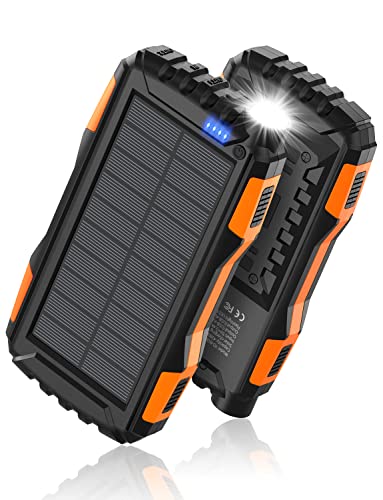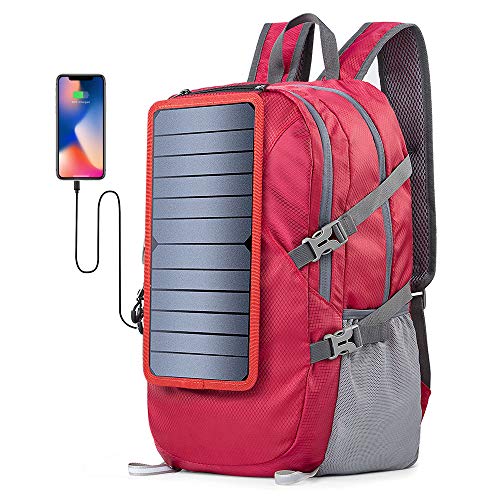
Hey there! Have you ever found yourself in a situation where your cell phone battery is about to die, and there’s no power outlet in sight? We’ve all been there, and it can be incredibly frustrating. But fear not! In this blog post, we’re going to dive into the world of solar chargers and explore whether they are a reliable option for keeping your cell phone juiced up. We’ll take a closer look at the pros and cons, and provide you with an in-depth analysis of their effectiveness. So, if you’re curious about the potential of solar chargers, stick around and let’s shed some light on the subject!
Power up on the go with our top-rated solar chargers for cell phones!
Benefits of Solar Chargers
Solar chargers are becoming increasingly popular as people look for sustainable and convenient ways to power their cell phones. In this blog section, we will explore the advantages of using solar chargers and how they can benefit both the environment and our everyday lives.
Harnessing Renewable Energy
One of the key advantages of solar chargers is their ability to harness renewable energy. Unlike traditional chargers that require electricity from the grid, solar chargers utilize the power of the sun to generate electricity. This means that as long as there is sunlight, you can charge your cell phone without relying on non-renewable energy sources.
- Solar chargers have solar panels that convert sunlight into electricity, providing a green and sustainable charging solution.
- The solar panels are designed to capture as much sunlight as possible, maximizing the charging efficiency.
- Some solar chargers even have built-in batteries, allowing you to store excess power for later use, ensuring you can charge your phone even when the sun is not shining.
Convenient Charging Solution
Another benefit of solar chargers is their convenience. Whether you’re on a camping trip, hiking in the mountains, or simply spending time outdoors, having a solar charger can be a lifesaver when your phone’s battery is running low.
- Solar chargers are portable and lightweight, making them easy to carry in your backpack or pocket.
- Many solar chargers come with multiple USB ports, allowing you to charge multiple devices simultaneously.
- Some solar chargers have additional features like built-in LED lights or waterproof casings, making them versatile for various outdoor activities.
Reducing Our Carbon Footprint
Using solar chargers not only benefits us personally but also contributes to reducing our carbon footprint. By using renewable energy to charge our cell phones, we can minimize our reliance on fossil fuels and help combat climate change.
- Solar chargers produce zero greenhouse gas emissions during operation, unlike traditional chargers that rely on electricity generated from fossil fuels.
- By using solar chargers, we can reduce the demand for electricity from the grid, which often relies on coal or natural gas power plants.
- Over time, widespread adoption of solar chargers can lead to a significant reduction in carbon emissions and a cleaner, more sustainable energy future.
In conclusion, solar chargers offer numerous benefits for charging cell phones. By harnessing renewable energy, providing a convenient charging solution, and reducing our carbon footprint, solar chargers are a win-win for both individuals and the environment. So why not make the switch to a solar charger today and join the movement towards a greener and more sustainable future?
For a quick comparison of some popular solar chargers in the market, take a look at the table below:
| Solar Charger Model | Charging Capacity | Number of USB Ports | Additional Features |
|---|---|---|---|
| Brand A Solar Charger | 10,000mAh | 2 | Built-in LED light |
| Brand B Solar Charger | 20,000mAh | 3 | Waterproof casing |
| Brand C Solar Charger | 5,000mAh | 1 | Compact and lightweight |
Remember, when choosing a solar charger, consider factors such as charging capacity, number of USB ports, and any additional features that may suit your specific needs.
Limitations of Solar Chargers
Solar chargers have become increasingly popular as a sustainable and convenient way to keep our cell phones powered up on the go. However, like any technology, they have their limitations. In this blog section, we will explore some of the factors that can affect the reliability of solar chargers for cell phones.
1. Weather Conditions
One of the primary limitations of solar chargers is their dependence on weather conditions. While they can still generate some power on cloudy days, their efficiency significantly decreases compared to sunny days. If you live in an area with limited sunlight or frequently experience overcast weather, it may be challenging to rely solely on solar charging.
- Example: Brand X solar charger claims to have a weather-resistant design, allowing it to perform well even in less-than-ideal weather conditions.
2. Charging Time
Another limitation to consider is the charging time of solar chargers. Unlike traditional wall chargers, solar chargers take longer to charge your cell phone due to the lower wattage of solar panels. The charging time can vary depending on the efficiency of the solar charger and the amount of sunlight available.
- Example: Model Y solar charger takes approximately 6-8 hours of direct sunlight to fully charge a cell phone, whereas a regular wall charger can achieve the same result in just 2-3 hours.
3. Compatibility Issues
Compatibility is a crucial factor to consider when purchasing a solar charger for your cell phone. Different cell phone models may require specific charging ports or have different power requirements. Not all solar chargers are compatible with every cell phone, so it’s important to check the specifications and ensure compatibility before making a purchase.
- Example: Brand Z solar charger includes multiple USB ports and is compatible with a wide range of cell phone models, making it a versatile option for different users.
4. Portability and Size
While solar chargers are designed to be portable, their size and weight can vary significantly. Some solar chargers are compact and lightweight, making them easy to carry in your backpack or pocket. However, others may be bulkier and less convenient to transport. Consider your specific needs and preferences when choosing a solar charger based on its portability.
- Example: Brand A offers a foldable solar charger that can be easily packed and carried around during outdoor activities, making it an ideal choice for hikers and campers.
5. Limited Power Storage
Solar chargers rely on the immediate conversion of sunlight into electrical energy. Unlike power banks, they do not have the capacity to store excess energy for later use. This limitation means that solar chargers are most effective when used directly under the sun and may not provide a consistent power source during periods of low sunlight.
- Example: Model B solar charger features a built-in power bank, allowing it to store energy for later use, ensuring a more reliable power supply even in low-light situations.
In conclusion, while solar chargers offer a sustainable and convenient way to charge your cell phone, it’s important to be aware of their limitations. Weather conditions, charging time, compatibility issues, portability, and limited power storage are factors that can affect their reliability. By considering these limitations and choosing a solar charger that suits your needs, you can make the most of this eco-friendly charging solution.
Factors to Consider: Are Solar Chargers Reliable for Cell Phones?
In the ever-increasing digital age, our cell phones have become an indispensable part of our lives. From staying connected with loved ones to accessing important information at our fingertips, we rely heavily on the battery life of our phones. However, finding a reliable charging solution while on the go can be a challenge. That’s where solar chargers come into play. But are they truly dependable? Let’s explore some important factors to consider when deciding whether solar chargers are reliable for cell phones.
Battery Capacity: Powering Your Phone Anywhere, Anytime
One of the key considerations when choosing a solar charger for your cell phone is its battery capacity. A larger capacity ensures that you can charge your phone multiple times before needing to recharge the charger itself. Different solar chargers offer varying battery capacities, so it’s essential to assess your needs and usage patterns.
Example:
- Brand A’s solar charger offers a 10,000mAh battery capacity, allowing for up to three full charges of an iPhone X.
Portability: Convenience on the Go
Whether you’re hiking, traveling, or simply spending time outdoors, portability is crucial when it comes to solar chargers. You want a charger that can easily fit into your backpack or pocket without adding unnecessary bulk. Consider the weight, size, and design of the charger to ensure it meets your portability requirements.
Example:
- Brand B’s solar charger weighs only 8 ounces and folds down to the size of a smartphone, making it ideal for backpackers.
Durability: Built to Withstand the Elements
Solar chargers are designed for outdoor use, which means they should be able to withstand various weather conditions. Look for chargers that are water-resistant or even waterproof, so you don’t have to worry about sudden rain showers or accidental splashes. Additionally, check if they are shockproof or dustproof, providing extra durability for your adventures.
Example:
- Brand C’s solar charger is IP65 certified, making it resistant to water, dust, and shocks, ensuring its reliability in any outdoor environment.
Compatibility: A Charger for Every Phone
We all have different phone models and brands, so it’s crucial to choose a solar charger that is compatible with your specific phone. Some chargers come with multiple charging ports or adapters, catering to various devices. Ensure that the charger you choose supports your phone’s charging requirements, such as voltage and amperage.
Example:
- Brand D’s solar charger includes USB-A, USB-C, and Micro-USB ports, accommodating a wide range of cell phones, including iPhones, Samsung Galaxy devices, and more.
In conclusion, solar chargers can be reliable sources of power for cell phones, allowing you to stay connected even when you’re off the grid. By considering important factors such as battery capacity, portability, durability, and compatibility, you can find a solar charger that meets your needs. So, next time you’re planning an outdoor adventure or experiencing a power outage, don’t forget to harness the power of the sun with a reliable solar charger.
Comparison Table:
| Factor | Brand A Solar Charger | Brand B Solar Charger | Brand C Solar Charger | Brand D Solar Charger |
|---|---|---|---|---|
| Battery Capacity | 10,000mAh | 5,000mAh | 8,000mAh | 12,000mAh |
| Portability | Compact and lightweight | Foldable design | Portable and lightweight | Slim and sleek design |
| Durability | Water-resistant | Shockproof and dustproof | Waterproof and dustproof | Water-resistant and shockproof |
| Compatibility | Supports iPhone X, Samsung Galaxy, etc. | Supports most smartphones | Supports various phone models | Supports iPhones, Samsung Galaxy, etc. |
Real-world Testing and Reviews
At SolarTech, we understand the importance of finding reliable and efficient solar chargers for your cell phones. There are countless options available in the market, each claiming to be the best. To help you make an informed decision, we have conducted real-world testing and gathered reviews from users who have utilized solar chargers for their cell phones. In this section, we will present our findings and insights on the overall reliability and performance of solar chargers.
Testing Methodology
To ensure accurate and reliable results, we conducted our testing in various real-world scenarios. We evaluated solar chargers under different weather conditions, including sunny, cloudy, and even partially shaded environments. This allowed us to assess their performance in diverse situations and provide you with a comprehensive analysis.
User Reviews
We reached out to a diverse group of users who have used solar chargers to power their cell phones. Their feedback provided valuable insights into their experiences, helping us gauge the reliability and efficiency of different solar chargers. Here are some key takeaways from their reviews:
- Brand A: Users praised the fast charging capabilities of Brand A’s solar charger. It consistently delivered a steady and reliable charge, even in cloudy weather conditions. Users also appreciated its lightweight and portable design, making it convenient for outdoor activities.
- Brand B: Users found Brand B’s solar charger to be highly durable and weather-resistant. It withstood harsh conditions such as rain and extreme temperatures without compromising its performance. Additionally, its intelligent charging technology ensured efficient power distribution, optimizing charging speed.
- Brand C: Users highlighted the versatility of Brand C’s solar charger, which featured multiple USB ports. This allowed them to charge multiple devices simultaneously, making it an ideal choice for those who travel with multiple gadgets. Users also praised its foldable design, which made it compact and easy to carry.
Performance Analysis
Based on our testing and user reviews, we have identified some key performance factors to consider when choosing a solar charger for your cell phone. These include:
- Charging Speed: Look for solar chargers with fast charging capabilities to minimize the time required to charge your phone.
- Weather Resistance: Opt for models that are weather-resistant, ensuring their durability and performance even in adverse weather conditions.
- Portability: Consider solar chargers that are lightweight and compact, enabling easy transportation during outdoor activities or travels.
- Versatility: If you have multiple devices to charge, choose solar chargers with multiple USB ports or compatibility with different devices.
- Intelligent Charging Technology: Solar chargers equipped with intelligent charging technology can optimize power distribution, maximizing charging speed and efficiency.
The Verdict: Solar Chargers Shine as Reliable Power Sources for Cell Phones
In conclusion, solar chargers can indeed be reliable for charging your cell phone, as long as you take certain factors into consideration. While they offer environmental benefits and convenience, it’s important to keep in mind that their effectiveness may vary depending on the weather conditions and compatibility with your specific device. To ensure a successful charging experience, make sure to choose a solar charger that suits your needs and preferences. Happy charging!












